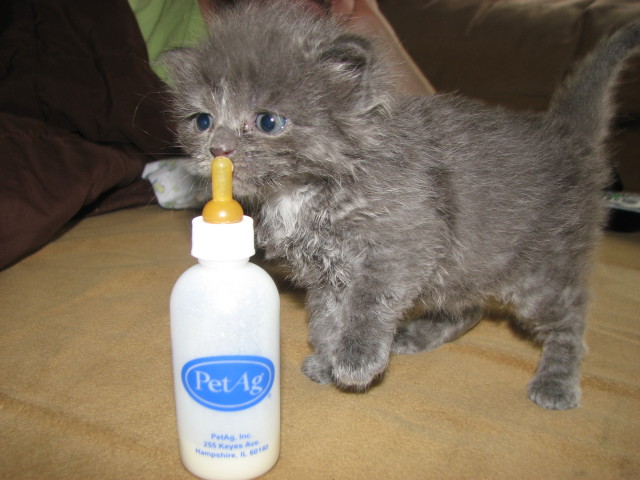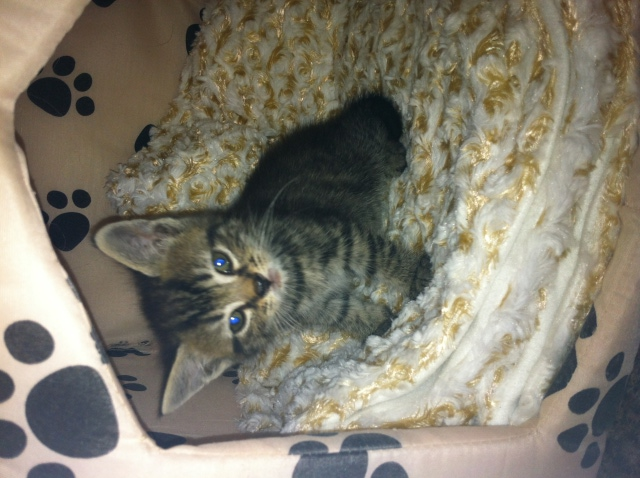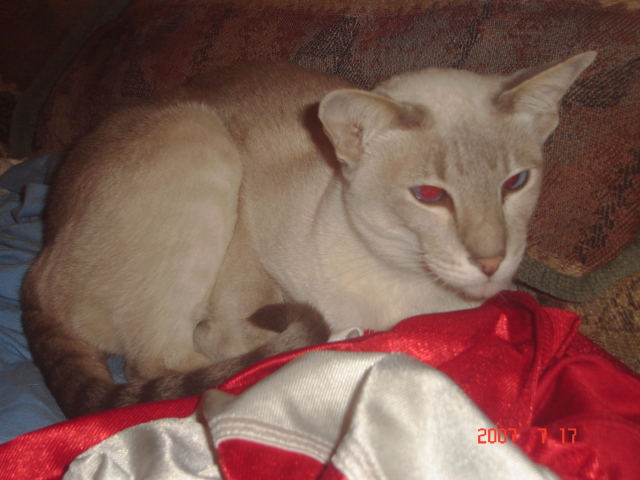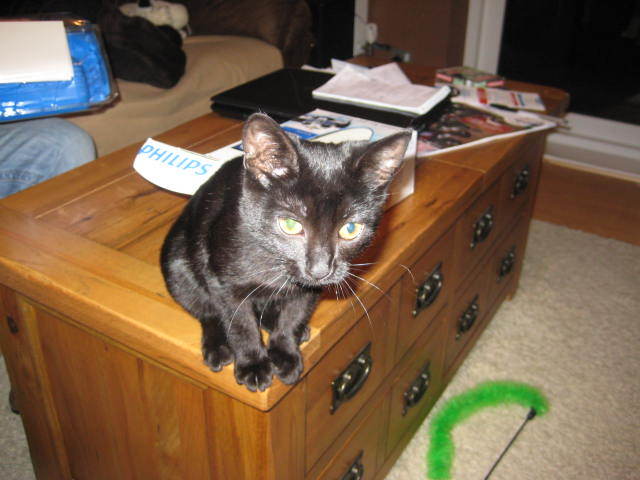QuestionSo my kitten (4 months) is having problems with walking. He is not walking upright and only takes a few steps before lying back down. So he doesn't eat or drink much without assistance, and the same with the litter box. He's gone to the vet already and found that he had a very minor ear infection, which I have read that ear infections can cause cats to drag their hind legs. Also he has had blood drawn and came back negative for FIV and FeLV. The vet said that due to his young age that the results might not be completely accurate.
I've done some mild research and found that it could be diabetes, constipation, parasites, or a neurological issue. he is scheduled to see a neurologist on the 13th of February. I'm hoping that it's not a neurological issue, but when when running my fingers down his spine to get a reaction, I witnessed his tail somewhat twitch. It wasn't in a specific spot that would spark a reaction, but I figured that i couldn't rule that information out.
Any information would help as to what could be the issue. I would really like to avoid putting him down. Thanks in advance.
AnswerAlex,
I do have a few questions upon reading your post...
- How long have you had this kitten?
- Where did he come from? (Breeder, rescue group, humane society, etc)
- Has he been having issues for as long as you've had him?
- Is he running any fevers?
- Are there any other signs that this kitten is showing beyond general weakness, worse in the hind end and needing help to eat/drink?
- How is this kitten behaving beyond the obvious issues? Is he a normal, healthy, happy, into everything kind of kitten or is he doing his best to be purely decorative?
- Did your vet run lab tests to check this kitten's overall organ function, blood glucose, blood counts, parasites, etc?
- Did your vet take x-rays of this kitten to see if there are any obvious spinal issues?
- Did you or the shelter/rescue group/breeder vaccinate this kitten prior to these signs showing up? (The reason that I ask this is because our youngest rescue kitten had a vaccine reaction that included seizure activity so neurological issues could be a less common sign of a vaccine reaction)
- Has the FIV/FeLV test been re-run just to be sure that his test wasn't a false negative? (which does happen from time to time, but usually the issue in young kittens is false positives due to maternal antibodies)
- Is your kitten using the litterbox normally?
- Could your kitten have gotten into anything toxic such as rodenticides, pesticides, household chemicals?
Having asked these questions I have a few points I'd like to make:
- My big surprise upon reading your post is not seeing you mention FIP (Feline Infectious Peritonitis) which can present with all kinds of weird signs... It's not the diagnosis you want to hear because ultimately it doesn't typically end well... We lost a rescued kitten to FIP last February and she just absolutely crashed - her blood work showed that her immune system was completely gone, her temperature was 105.5 F, she wouldn't eat or drink and all she wanted to do was sleep... This happened very quickly over the course of a weekend and on the Monday morning we essentially let the vet know that we needed answers, both for us and for Jellybean... The answers weren't good and unfortunately we had to humanely euthanize that day which broke our hearts... Jellybean was only 11 months old...
FIP is currently a diagnosis of exclusion in the sense that there is no foolproof test that will tell you if a kitty has FIP or not because FIP is caused by a coronavirus that most every cat is exposed to mutating within that individual cat... A perfect storm of sorts. FIP researchers have not been able to figure out exactly why the coronavirus mutates in some cats and kittens but not others, the general feeling at this point is that it may be a genetic issue but there's no solid evidence at this point so at best these are educated theories... Part of why FIP is so heartbreaking and confusing to diagnose is because there are no easy answers... FIP has two forms, the wet form which is easier to diagnose because fluid accumulates in the abdomen and sometimes the chest.... The dry form of FIP is harder to diagnose because it presents with so many vague symptoms that could indicate a number of other conditions... Often it isn't until a kitty with dry FIP simply crashes that veterinarians will have a good hunch that it may be dry FIP.
Sadly the cats most often affected are between 3 months and 3 years of age.
Unfortunately FIP does not have any known long term treatment or cure at this point so if your kitten does have FIP and he crashes the most humane answer for him will likely be to euthanize... I know that in my local area veterinarians and veterinary technicians that I have spoken to have said that they're seeing a greatly increased incidence of suspected FIP cases in kittens and young cats lately... I don't know if this is specific to my area or a general thing that's happening amongst domestic cats at this point...
- Diabetes can present in young kittens but it's far more common in older, overweight cats, often males.
- As far as constipation causing your kitten's weakness I have to say I'm not entirely convinced that is what's happening here. I could understand if your kitten was simply cranky and out of sorts, perhaps even not having much of an appetite because these are things I've seen in constipated kitties before. I have a kitty who we affectionately refer to as anal retentive because he used to get severely constipated quite often when I fed a dry food only diet. That being said, his record for holding onto his stool was roughly 2 weeks and he showed no neurological signs at all - he had an obviously uncomfortable tummy and he was awfully cranky but he never dragged his hind legs.
- Another issue that you don't mention that I would wonder about based on the information you've given me is how this kitten's heart is functioning. Sometimes kitties with heart problems will have poor appetite, lethargy and weakness as signs that they're not well. At this age your kitten could very well have a congenital heart defect that's causing him issues... Some are correctable by surgery, others are manageable in a palliative way.
- Saying that a kitten has a neurological issue is somewhat vague... It's important to know whether or not this kitten has been this way from birth and is simply worsening as he gets bigger and has to support more weight OR if this is a completely new, sudden onset kind of issue. It also matters whether the issue is with this kitten's brain, spinal cord or whole body. If it is a simple spinal cord issue you may be able to get him a kitty wheelchair and do physical therapy to help strengthen his back end which should help him to regain function. If this is a brain or whole body issue I would be more concerned about a poor prognosis.
In all honesty this is a tough sounding situation that may not have any easy answers. My heart goes out to you and your kitten and I'm hoping that the news is good news, but I do think it's fair to say that at this point it would be best to expect the worst and hope for the best. If you have any further questions or concerns, please feel free to contact me again at any time - I am more than happy to help in any way that I can. Please feel free to keep me updated as I would be interested to know what's happening with your little guy.
Kind regards,
Ali

 bottle feeding orphan kitten.
QuestionQUESTION: I rescued my kitten when he was 2 wee
bottle feeding orphan kitten.
QuestionQUESTION: I rescued my kitten when he was 2 wee
 Bengal kitten?
Question
Pic Picture
Hello, I was wonderi
Bengal kitten?
Question
Pic Picture
Hello, I was wonderi
 Siamese tracks feces around the house
Question
Dirty Foot
I recently adopted a wonderf
Siamese tracks feces around the house
Question
Dirty Foot
I recently adopted a wonderf
 Cat in Heat with a little blood in her stool
Question
Millie Moo
Hi, I have a 5 month old female kit
Cat in Heat with a little blood in her stool
Question
Millie Moo
Hi, I have a 5 month old female kit
 cat identification
Question
pic was from my phone,
i am currently f
cat identification
Question
pic was from my phone,
i am currently f